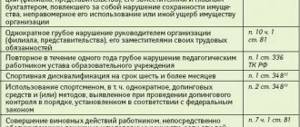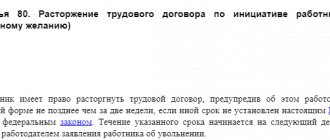Dismissal of a municipal and civil servant at his own request is an accessible way to terminate an employment relationship. Such employees are subject to the Labor Code of the Russian Federation (with some nuances), as for ordinary workers.
According to the Labor Code of the Russian Federation, a municipal or civil servant is obliged to notify of his intention to resign two weeks in advance, namely, to submit an application to the personnel department.
It must clearly formulate the reason for the calculation, if any, and the date of compilation, which is needed to establish the day of dismissal. Within two weeks (after submitting the application), the civil servant must transfer all matters to the service and sign the bypass sheet. He can also withdraw his application.
An employee may exercise his right to dismissal on his own initiative, without any valid reasons and for good reasons.
Please note that the validity of the reasons must be documented.
Termination of employment relationship
Dismissal from the civil service can be carried out at one's own request; this is the right of the employee. Actually, this initiative has several distinctive features:
- a state or municipal employee can resign of his own free will at any time, since he has such a right;
- such dismissal should not be justified by any arguments, the employee cannot be limited by conditions;
- if a municipal employee or civil servant has an agreement with management, then he may not work for the period established by the employment contract;
- upon dismissal from municipal service or civil service, an official receives a full payment, which consists of salary and other deductions.
A civil servant receives due payments on the day of dismissal. On the same day, he must be issued a properly executed work book.
Order of dismissal
The execution of an order for release from service is a document that must certainly be executed.
The preparation of such paper is governed by general rules. In the text, in addition to the mandatory information about the parties to cooperation, it is necessary to indicate the date and reason for dismissal from the position, as well as information about payments due to the employee. In this case, reference is made to an article of a special law.
Regulatory acts do not stipulate the period for familiarizing a civil servant with the order. In practice, this happens on the day the order is signed by the head of the organization. Refusal to read must be recorded by drawing up an act.
Procedure and features of the procedure
When a municipal or civil servant is dismissed at his own request, he must write a corresponding statement. It is worth keeping in mind that you do not need to explain the reason for your decision; the employer does not have the right to demand this.
Important! Those who began serving in the field can also resign at will, that is, the state paid for their studies. At the same time, you need to understand that in the event of termination of the employment relationship, you will have to return the funds spent on education.
There is an opinion according to which, after dismissal from the civil service, a person does not have the right to get a job in the state or municipal service within a two-year period. However, it is erroneous, since labor legislation does not provide for such restrictions.
Who are municipal employees?
We find the definition in Article 10 of Federal Law No. 25-FZ of March 2, 2007: this is the name given to an employee who holds a municipal position in a local government body.
Work in such a position is regulated by local regulations, and remuneration for work is paid to him from the local budget. It is impossible to identify civil servants who work in federal government bodies and government bodies of constituent entities of the Russian Federation and local employees - these are two separate systems. The municipal service is not a subtype of the state civil service and is regulated by special legislative acts.
Payments and compensations
If a municipal or civil servant terminates an employment relationship at his own request, he must be paid the funds due to him. These include
- An employee's salary accrued for the time he actually worked. The calculation is based on the average pay per day of service, for example, if he earns 2,000 per day, then for 20 days worked he will receive 40,000.
- He will also be paid a bonus. They are calculated per year or quarter. If there is such a case that work was not completed for some time during the quarter, then there will be a reduction in the premium in proportion to the number of such days.
- Compensation payment for vacation days that were not used.
How is the dismissal of a municipal employee formalized?
The removal procedure consists of the following steps:
- Identification and documentation of grounds.
- Issuance of an order.
- Making entries in the citizen’s work book and issuing all documents.
- Full payment.
For example, dismissal of a municipal employee at his own request involves the following sequence of actions.
Step 1: The municipal employee submits the application.
It does not have a strictly defined form; the employee composes it in the form in which he sees fit. It is important that the document clearly expresses the intention to quit and the date on which the employment relationship will be terminated.
Step 2. Transfer of cases.
The day after the application is submitted, the two-week work period begins to run. The employer looks for a replacement for the resigning employee, and he finishes and transfers the work.
Step 3. The employer issues an order to dismiss a municipal employee using the unified form T-8, approved by Resolution of the State Statistics Committee of the Russian Federation dated January 5, 2004 No. 1.
Step 4. On the last day of work, a note about dismissal is made in the work book. It and the other documents of the employee are handed over to him.
Step 5. Full calculation. All money due must be paid on the last business day.
Dismissal from civil service procedure and rules
In order to resign, a municipal (in local authorities) or civil servant must first inform management about it. This is done in the form of an application. A sample application can be obtained by contacting the HR department. There is no need to indicate a reason, except in cases where the dismissal is related to retirement or employment in an elective position.
You only need to choose the official form, that is, get it from the organization where you are serving, since they differ. In the case where a person downloaded a sample from the Internet, then most likely the application will have to be written again. After the termination of the employment relationship, a personal file is drawn up for each employee, which is then stored in the archive.
How is the dismissal of municipal employees regulated?
The main law regulating the general rules for entering into labor relations and dismissing employees is the Labor Code of the Russian Federation. Chapter 13 is devoted to dismissal issues.
A special law that establishes features applicable only to local employees is the Federal Law of March 2, 2007 No. 25-FZ “On Municipal Service in the Russian Federation.” Article 19 of this law contains special conditions for the release of local employees from positions. They apply only to this category of workers.
Application for dismissal from civil service: sample
In 2021, the laws do not establish a uniform application form for everyone, which is written when a person wishes to resign from service. In this regard, it is compiled in free form or according to the format that is used in each specific organization. However, there are rules that must be followed when writing:
- must be written by hand, that is, typewritten applications are not accepted;
- must be addressed directly to the employer or his representatives, and not to the head of the department in which the service took place.
Features for the police
Removal from positions of police officers is subject to the rules established by Federal Law No. 342-FZ of November 30, 2011 and the Labor Code of the Russian Federation (in the part that is not regulated by 342-FZ), but is not subject to Federal Law No. 25-FZ, since the police, being a structure Ministry of Internal Affairs of the Russian Federation, does not apply to local authorities.
An initiative to create a municipal police force funded from local budgets is being considered, but this has not yet been implemented.
The procedure for dismissing a police officer on his own initiative is regulated by Federal Law No. 342-FZ of November 30, 2011. Article 84 indicates that a police officer has the right to decide to dismiss before the end of his contract. To leave the service, he submits a report at least one month before the expected termination of the contract.
Is personal income tax paid?
Speaking about whether state or municipal employees pay taxes on income received, it is worth noting that the laws apply equally to all citizens, regardless of what position they hold. In this regard, these persons also pay 13 percent of their profits.
At the same time, the employee does not pay the tax on his own; the organization in which he serves does it for him. Taxes will not be imposed on those payments that an employee receives as compensation when staffing is reduced.
In some cases, the employee was hired under conditions designed specifically for him. That is, an agreement was concluded on personal terms, it stipulated the benefits that the employee would receive in the event of dismissal. If it was indicated that such a benefit would be larger, that the salary would be average, then the person would have to pay taxes that are provided for by law.
In addition, it is worth noting that funds paid as compensation for vacation days unused by the employee are also subject to taxation.
Grounds for termination of the contract
Special rules provide for cases when labor relations with a municipal employee can be terminated. These include:
- Mutual consent of the parties to professional cooperation.
- The end of the validity period of the signed agreement.
- Personal intention of the employee.
- Leader's initiative.
- Transfer of a person with his consent or at his personal request to another state budgetary authority.
- Refusal to further perform duties in the current position due to significant changes in the terms of the agreement.
- Disagreement with a transfer to another place for health reasons or the manager’s inability to offer the person a vacancy.
- Refusal to work in another territory together with the organization.
- Involvement in the performance of duties in military or alternative service.
- A court decision to reinstate a former employee.
- Election to the trade union committee on the terms of paid work.
- Unforeseen circumstances that make further work impossible - war, natural disasters, major accidents, mass diseases.
- Application to an employee of a criminal penalty that precludes further activities.
- Establishment of the complete incapacity of a specialist based on a medical report or court decision.
- Reaching the age at which a person can retire.
- Application of administrative sanctions in the form of deprivation of professional qualifications.
- Departure of an employee. This also includes declaring a person dead or missing by a court decision.
- Violation of the rules for concluding an employment contract.
- Renunciation of Russian citizenship.
- Failure to comply with restrictions and prohibitions established for the employee.
It should be noted that such a list is exhaustive, that is, it contains all the reasons for dismissing a person.
Employer initiative
The reason for termination of labor relations may be the initiative of managers. Such circumstances include:
- The employee’s state of health that prevents further work.
- Insufficient level of qualifications, provided that such a fact is confirmed by the results of a knowledge test.
- Committing guilty actions that became the reason for the loss of trust in a specialist.
- Misconduct on the part of an employee who has previously been subject to disciplinary measures.
- Absence from work for more than four hours continuously.
- Coming to the organization under the influence of alcohol or illegal drugs.
- Disclosure of information protected by law to unauthorized persons.
- Theft of material assets or property of employees, provided that this is established on the basis of a decision of a court or other authorized body.
- Violation of labor safety rules, if this was the cause of an accident or incident.
- Making an unreasonable decision that led to the loss, damage or illegal use of the organization’s property. This rule applies to employees holding managerial positions.
- Submission by a person of false information and data about himself when applying for a job.
- Restricting access to information resources if their use is required for the full implementation of professional activities.
- Abolition of the current position.
- Liquidation of the organization.
Dismissal for health reasons or due to a low level of qualifications is allowed only in cases where it is impossible to offer the employee an alternative work option.
Employee initiative
A civil servant may terminate professional cooperation at his personal request. The reasons for such a decision are not determined by current legislation. Most often this happens in the following cases:
- Failure by the manager to fulfill his obligations - delay in salary, biased attitude, unreasonable postponement of vacation.
- A more profitable work option. This is most often associated with an increase in salary.
Regardless of the reason for dismissal, a person is obliged to inform the employer of his decision in advance. At the same time, he is not obliged to explain the reason for leaving.
Documentation procedure
Article 80 of the Labor Code of the Russian Federation provides for the rules for terminating employment relationships at the request of the employee. In particular, he must notify the employer of this no later than fourteen days before the date of departure. This is due to the fact that such a period will be required to complete existing cases, transfer them, and also complete the bypass sheet.
After receiving this application, the employer responds by issuing an order setting the date of dismissal. On the specified day, the employee can receive a book that reflects his work activity. The corresponding entry will already be made in it.
In the case where there is access to a secret protected by law, it will be necessary to sign documentation on its non-disclosure.
» alt=”How does the dismissal of a municipal and civil servant happen at his own request”>
Entry in the work book about admission to the municipal service
Registration of admission to municipal service.
Consequently, the Instructions do not establish any uniform wording to be used for making an employment entry. Therefore, it is permissible to write both “Accepted to the position” and “Appointed to the position.”
The entry of a citizen into the municipal service is formalized by an act of the representative of the employer (employer) on appointment to a position in the municipal service. In accordance with Article 43 of the Federal Law of October 6, 2003 No. 131-FZ “On the General Principles of the Organization of Local Self-Government in the Russian Federation,” orders of the head of the administration are issued on issues of organizing the work of the local administration.
According to the Resolution of the State Statistics Committee of January 5, 2004 No. 1, the unified forms of primary accounting documentation specified in paragraph.
1.1. Resolutions (form T-1) apply to all organizations. Taking into account the peculiarities of municipal service, it is necessary to adapt these forms for use in local governments. In this case, the changes made must be documented in the appropriate organizational and administrative document (see.
Attention This type of punishment is applied for the period: a)
Council of the Association “Council of Municipal Entities of the Republic of Bashkortostan”
5. Registration of admission to municipal service. The entry of a citizen into the municipal service is formalized by an act of the representative of the employer (employer) on appointment to a position in the municipal service.
In accordance with Article 43 of the Federal Law of October 6, 2003 No. 131-FZ “On the General Principles of the Organization of Local Self-Government in the Russian Federation,” orders of the head of the administration are issued on issues of organizing the work of the local administration. According to the Resolution of the State Statistics Committee of January 5, 2004 No. 1, the unified forms of primary accounting documentation specified in paragraph.
1.1. Resolutions (form T-1) apply to all organizations. Taking into account the peculiarities of municipal service, it is necessary to adapt these forms for use in local governments.
In this case, the changes made must be documented in the appropriate organizational and administrative document (see example Appendix No. 2)










